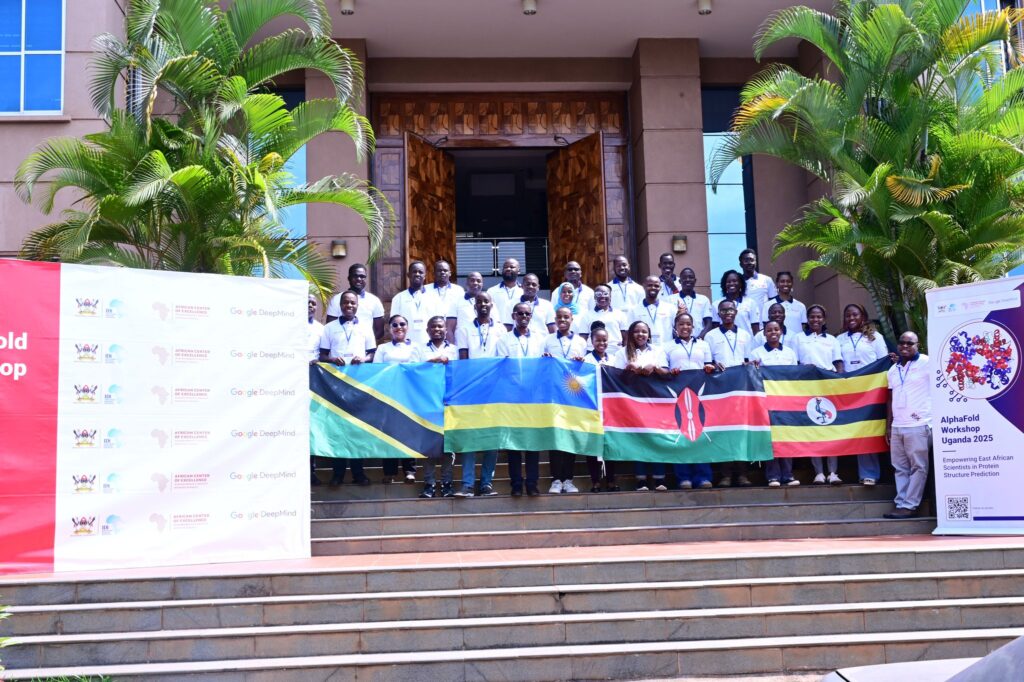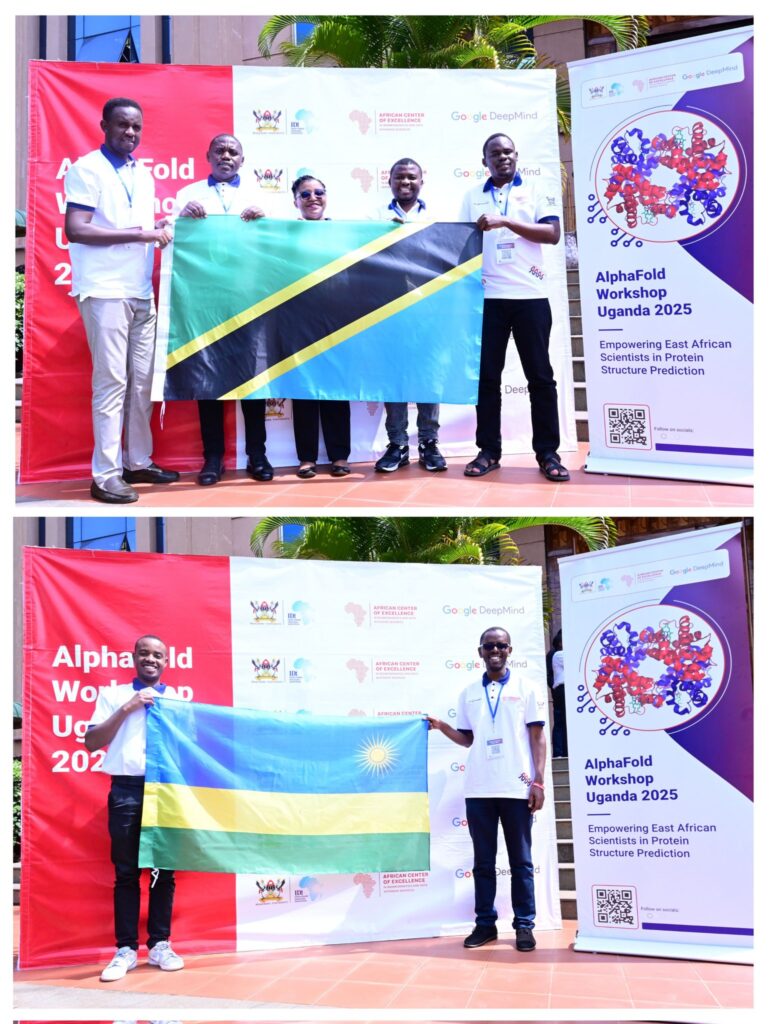
Participants engaging in hands-on AlphaFold sessions at the Infectious Diseases Institute, Makerere University.
In the heart of Kampala, Uganda, from June 16 to 20, 2025, a transformative event unfolded: the AlphaFold Workshop Uganda 2025. Hosted by the African Center of Excellence in Bioinformatics and Data Intensive Sciences (ACE-Uganda) at the Infectious Diseases Institute (IDI) of Makerere University, this five-day intensive brought together over 50 researchers, students, and early-career scientists from Uganda, Kenya, Tanzania, and Rwanda. While the original call for applications targeted those in protein-related research, structural biology, or bioinformatics, the workshop exceeded expectations by fostering a vibrant community eager to harness artificial intelligence (AI) for biological breakthroughs.
What makes this workshop particularly noteworthy? At its core was AlphaFold, Google DeepMind’s groundbreaking AI system that predicts protein structures with unprecedented accuracy. For readers dipping into bioinformatics—whether you’re a student eyeing drug discovery, a researcher tackling infectious diseases, or a professional curious about AI’s role in health—AlphaFold represents a game-changer. Traditionally, determining a protein’s 3D structure via experimental methods like X-ray crystallography or cryo-electron microscopy could take months or years, costing hundreds of thousands of dollars. AlphaFold flips this script: it generates predictions in minutes from just an amino acid sequence, achieving near-experimental precision in most cases.

To understand why this matters, consider proteins as life’s molecular machines. They fold into intricate 3D shapes that dictate their function—enzymes catalyzing reactions, antibodies fighting pathogens, or receptors signaling in cells. Misfolded proteins underlie diseases like Alzheimer’s or cancer, and understanding their structures unlocks pathways to new therapies. AlphaFold’s neural network, trained on vast datasets from the Protein Data Bank, uses deep learning to infer evolutionary patterns via multiple sequence alignments (MSAs). It processes these alongside pairwise residue interactions, outputting atomic-level coordinates. As of 2025, the AlphaFold Protein Structure Database—freely accessible via EMBL-EBI—holds over 214 million predictions, covering nearly all known proteins and empowering researchers worldwide.
The workshop’s agenda was meticulously designed to demystify these concepts and equip participants with practical tools. Day one kicked off with foundational lectures on protein folding basics and AlphaFold’s architecture. Led by ACE-Uganda faculty and guest experts from Google DeepMind, sessions covered the Evoformer module—AlphaFold’s innovative engine that embeds MSAs and templates for iterative refinement—and the structure module, which assembles 3D models complete with side-chain positions. Participants learned to evaluate prediction confidence using pLDDT scores (predicted Local Distance Difference Test), where values above 90 indicate high reliability, akin to experimental structures.
Hands-on sessions dominated days two through four, using Google Colab notebooks for accessible, cloud-based computing—no high-end hardware required. Attendees submitted FASTA sequences of their research proteins, running AlphaFold2 to generate unrelaxed and relaxed structures, ranked outputs, and metadata like computation times. A highlight was modeling disease-relevant targets: one group predicted the structure of a Plasmodium falciparum protein implicated in malaria resistance, revealing potential binding pockets for novel antimalarials. Another explored HIV envelope glycoproteins, identifying epitopes for vaccine design. These exercises illuminated AlphaFold’s limitations too—such as challenges with disordered regions or multimers—teaching participants to integrate predictions with molecular dynamics simulations for refinement.
By day five, the focus shifted to applications, sparking what many called a “eureka” moment. In drug discovery, AlphaFold accelerates structure-based design: predicting how small molecules dock into protein pockets to inhibit rogue enzymes, as seen in recent successes like a CDK20 inhibitor for cancer. For immunotherapy, it maps antibody-protein interfaces, aiding CAR-T cell therapies or checkpoint inhibitors like TIM-3 blockers. In Africa, where infectious diseases claim millions annually, this is revolutionary. Participants discussed using AlphaFold for Ebola glycoprotein modeling or tuberculosis effectors, aligning with regional priorities like antimicrobial resistance.
We must acknowledge the pivotal support from Google DeepMind, whose partnership extended beyond funding to technical expertise and open-source resources. DeepMind’s commitment to equitable AI access shines through initiatives like the AlphaFold Database and capacity-building in under-resourced regions. As noted in their 2025 impact reports, they’ve backed similar workshops across Africa via BioStruct-Africa, providing scholarships, compute credits, and mentorship to over 500 scientists since 2023. This collaboration with ACE-Uganda—part of a broader NIAID-facilitated consortium—delivered high-performance computing infrastructure, ensuring seamless access to AlphaFold’s demands. Without this, the workshop’s scale would have been impossible, underscoring DeepMind’s role in democratizing tools that once favored well-funded labs.
The event wasn’t just technical; it was a catalyst for collaboration. Daily networking breaks and a closing panel featured alumni from prior ACE programs sharing how AlphaFold advanced their work—from enzyme engineering for sustainable biofuels to genomic studies of neglected tropical diseases. Regional ties strengthened through group projects, where Kenyan and Tanzanian teams paired with Ugandan hosts to brainstorm cross-border research on shared health threats like Rift Valley fever. Feedback surveys revealed 95% of participants felt “highly confident” in applying AlphaFold post-workshop, with many planning to train peers back home.
For those seeking bioinformatics knowledge, this workshop exemplifies accessible entry points. AlphaFold lowers barriers: no PhD required, just curiosity and a laptop. Readers interested in similar opportunities should explore ACE-Uganda’s site for upcoming events, like the She-Data Science Program launching in October 2025, which targets women in AI and bioinformatics. Dive into the AlphaFold Database yourself—upload a sequence and visualize outputs in tools like PyMOL or ChimeraX. Key takeaways for beginners: Start with single-chain predictions, validate against known structures, and combine with wet-lab validation for robustness.
ACE-Uganda’s mission—to drive innovation for Africa’s health outcomes—pulses through events like this. As bioinformatics evolves, with AlphaFold 3 now tackling multimers, ligands, and RNA, the potential for homegrown solutions grows. Imagine Ugandan-led therapies for sickle cell anemia or HIV, born from these sessions. The workshop didn’t just teach tools; it ignited a movement. If you’re in structural biology or drug design, join the conversation—Africa’s bioinformatics future is unfolding now.
